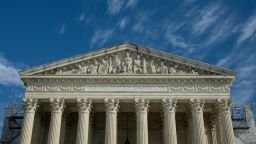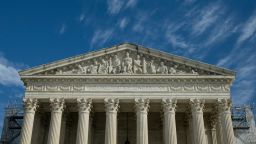




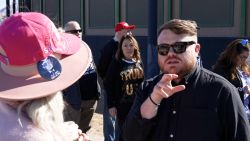
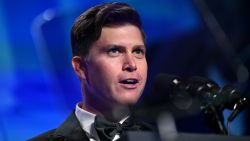

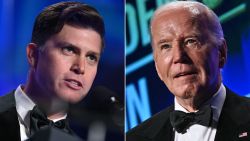

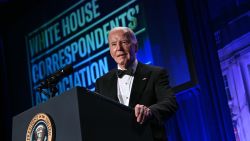

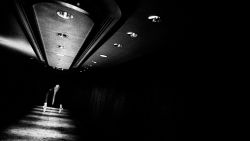











Editor’s Note: Norman Eisen is a CNN legal analyst and editor of “Trying Trump: A Guide to His First Election Interference Criminal Trial.” He served as counsel to the House Judiciary Committee for the first impeachment and trial of Trump. The views expressed in this commentary are his own. Read more opinion at CNN.
Hello from the Donald Trump criminal trial in New York, where the testimony of the opening star prosecution witness David Pecker wrapped up this week — and where the former president pointed at me and scowled as he left the court for the morning break on Friday.
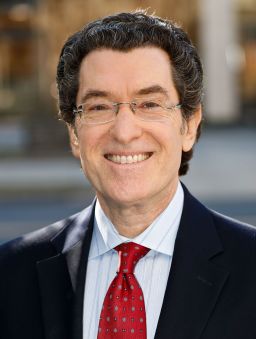
Every day has felt consequential here, but Friday was even more so after Thursday’s Supreme Court hearing on whether Trump can avoid other federal criminal trials by claiming presidential immunity (Trump has denied all wrongdoing in the cases). The buzz in the line Friday morning as we waited to enter the Manhattan courtroom was that, given the way the oral arguments in Washington went, this might well be the only criminal trial that Trump faces in 2024.
So the New York case matters more than ever — but Trump defense counsel Emil Bove seemed to be missing a beat Friday morning after having gotten off to a promising start in his cross-examination of Pecker, the former publisher of the National Enquirer, the day before.
Bove started off forcefully on Thursday, eliciting a series of admissions to bolster the defense theory that the payoff to former porn star Stormy Daniels was a routine nondisclosure arrangement — not a nefarious election fraud plot as alleged.
But he made a critical mistake in seeming to mislead the jury Thursday afternoon, and Judge Juan Merchan put him on a much shorter leash on Friday. Bove’s stumble came when he insinuated Pecker was changing his story about the key August 2015 Trump Tower meeting — where the alleged conspiracy to benefit the Trump campaign was formulated — that ultimately led to Daniels getting the payments to bury her story of her alleged affair with Trump. (Trump has denied the affair.)
Pecker had testified on direct examination Thursday that former White House Communications Director Hope Hicks, then Trump’s campaign press secretary, was in and out of the meeting. Bove asked a series of questions implying that Pecker was making that up after the fact because he had not said anything about her presence when the feds first questioned him.
Sitting in the courtroom, I could see the jury was paying rapt attention and that they were perhaps wondering if the star witness’ light was dimming. But then, Pecker asked to refresh his recollection by seeing the document on which Bove seemed to be relying for his insinuation about Pecker — and Bove gave him a document that seemed to contain no such basis for that implication. To the jury, it looked like Pecker might have been caught in a lie, or at least selective memory, without Bove having properly backed it up with what he showed the witness.
A clearly frustrated Merchan sent the jury home and then chastised Trump’s lawyer, telling him to be “very careful.” Merchan said the matter would need to be corrected before the jury Friday morning.
Indeed, Bove was forced to apologize to Pecker in front of the jury to open the day. That is never a good start for a lawyer (I can’t recall having to do it in 30-plus years in court). The judge compounded matters by keeping Bove under very close scrutiny lest he err again. Bove’s tone in questioning was initially less aggressive, and so less effective in suggesting skepticism about the witness, than it had been the day before. And I counted about 10 objections by the prosecution that the judge sustained in the morning alone, blunting Bove’s attempt to get momentum – and answers from Pecker!
Bove moved along as best as he could, attacking the holes in the case that remained. Bove got Pecker to concede that the National Enquirer did “catch and kill” stories to bury damaging information about high-profile people all the time. (This is true, and it’s not illegal. But in this case, per Pecker’s earlier testimony, there was also an agreement to do it to benefit a campaign, and that is a crucial element to this case’s charges of falsifying business records to conceal an agreement with others to unlawfully influence the 2016 election.)
Bove also contrasted Pecker’s testimony with what was in the FBI notes of Pecker’s first 2018 interview with the feds. (Pecker pushed back by pointing out that he knows what he said and the notes might be wrong.) And Bove intimated that Pecker cannot directly connect Trump to the allegedly illegal payments then-Trump fixer Michael Cohen made to Daniels at a later date. (Again, true, but there are other witnesses lined up to speak to that.)

